BBC Duped into Promoting Marketing Scheme for Microdosing Psychedelics
A recent BBC story entitled “The ‘psychedelics coach’ with drug-fuelled career advice,” offers an opportunity to examine what happens when sloppy journalism and self-promotional psychedelic marketers collide.
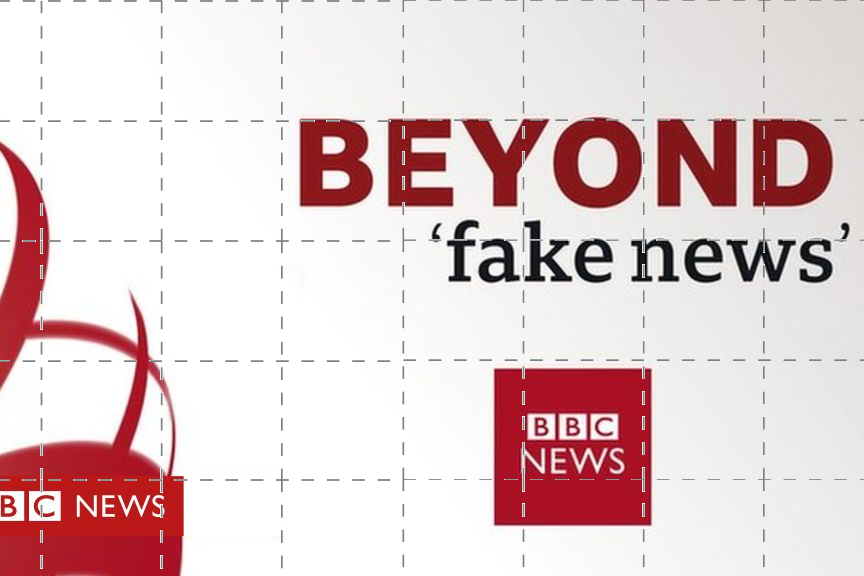
Psymposia is a 501(c)(3) nonprofit research and media organization that offers critical perspectives on drugs, politics, and culture. We rely on contributions from our readers and listeners. Your support is vital to sustaining Psymposia.
Support Psymposia’s independent journalism on Patreon and help us drive the Mystery Machine! We’re a bunch of meddling kids who are unmasking the latest shenanigans on the psychedelics beat.
Advocates are hailing psychedelics as the next big thing in healthcare; proclaiming their utility for everything from treatment resistant depression, to managing inflammation, to increasing workplace productivity. As carpetbaggers like The 4-Hour Workweek author, Tim Ferriss, and Goop pseudoscience peddler, Gwyneth Paltrow, flock to the burgeoning “psychedelic healthcare industry,” they are deploying the same tactics they have used elsewhere to push mainstream media coverage of psychedelic drugs.
As Paltrow’s and Ferriss’ business approaches demonstrate, in a post-truth world, meaning is what you make of it. In response to a false-advertising lawsuit by prosecutors from 10 California counties, Goop sidestepped prior health claims about its “yoni eggs.” To avoid culpability for its marketing, Goop claimed that it merely, “provides a forum for practitioners to present their views and experiences with various products like the Jade Egg.” Ferris engages in a similar form of crowdsourced credibility. However, when it comes to manufacturing expertise, he takes a more direct approach:
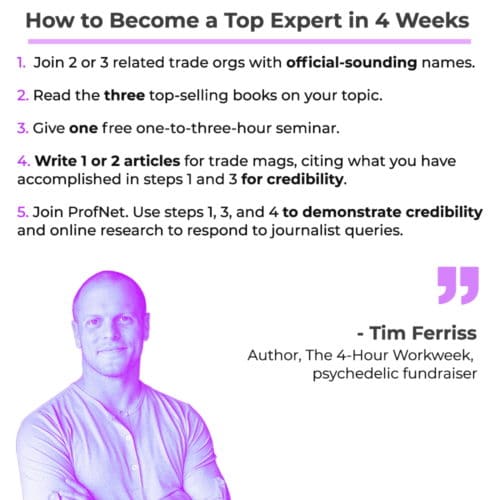
In other words, Ferriss offers charlatans, conmen, and marketers of all stripes a simple how-to guide for creating an aura of authority—it’s not about gaining true experience and mastery, it’s about generating a perception of expertise in order to build a brand and drive sales.
A recent BBC story entitled “The ‘psychedelics coach’ with drug-fuelled career advice,” offers an opportunity to examine what happens when sloppy journalism and self-promotional psychedelic marketers collide. In the piece, author Colleen Hagerty introduces us to Paul Austin—self-described “psychedelic life coach” and founder of the for-profit company, The Third Wave—and his apparent client, Matt Gillespie. According to Hagerty, Gillespie is just another customer of Austin’s coaching service, which, “requires a minimum three-month commitment…with a $1,000 to $2,000 per month price tag.”
Hagerty fails to disclose to readers that Gillespie is professionally affiliated with The Third Wave, in addition to being a professional marketing consultant—he is simply presented as an entrepreneur and client seeking Austin’s guidance. However, Gillespie is currently listed on The Third Wave’s LinkedIn page as an employee of the company, and Gillespie identifies himself as the “Community Coordinator” for The Third Wave from “September 2018—Present” on his own LinkedIn page. Additionally, multiple Psymposia volunteers encountered Austin and Gillespie working side-by-side at a Third Wave promotional table at the Horizons: Perspectives on Psychedelics 2018 conference, and have communicated with Gillespie through his official Third Wave email in prior correspondence.
Psymposia reached out to Colleen Hagerty, and BBC Worklife editor, Kieran Nash, within two days of the story being published, to inquire whether they were aware of the relationship between Austin and Gillespie; neither have responded to our inquiries. After stating clearly that Psymposia was writing a story about the BBC piece, Austin and Gillespie were both asked to comment. Austin replied, stating:
“Matt is not and never has been an employee of The Third Wave. In the past, he was an independent contractor/freelancer for 3-4 hours per week to help organize events. His participation with The Third Wave was on and off from October 2018 until May 2019. There is an important legal distinction between an ’employee’ and ‘independent contractor/freelancer’…”
and
“It did not seem relevant to tell [Hagerty] of this [working relationship] considering the coaching-client relationship between Matt and I is outside the scope of his previous collaboration with Third Wave.”
Psymposia has also sent an inquiry to BBC World News regarding this failure to disclose and will update if and when we receive a reply.
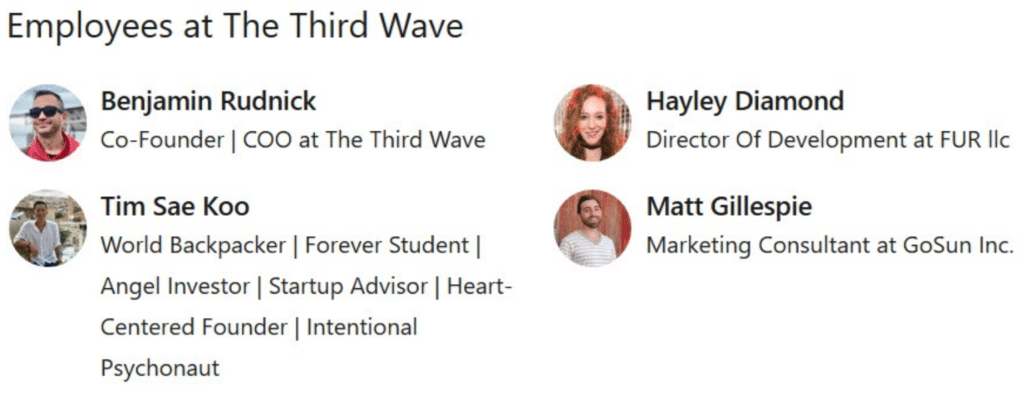
Apparently, Paul Austin believes that it’s ethical to use “independent contractors/freelancers” in his marketing testimonials, without disclosing their connections to his business. Ethics aside, both the Federal Trade Commission in the US and the Competition and Markets Authority in the UK identify these kinds of misrepresentations and nondisclosures of business relations as unlawful, on consumer protection grounds.
Advertising disguised as news is hardly a new trick. But, given the business association between Gillespie and Austin, it appears that Hagerty was duped into penning undisclosed sponsored content, akin to astroturfing; allowing Austin and The Third Wave to drum up additional press for their (soon-to-be-expanded) business ventures. Now, Austin is using this story to promote forthcoming “higher-end services,” presumably with a matching higher-end price tag. Unfortunately for his target audience, it seems unlikely that they would be positioned to recognize this story as a marketing fabrication. In a LinkedIn post on January 8, 2020, Austin stated:
“Publication of this piece comes at an excellent time. Thus far, we’ve remained quiet about our higher-end services, not spending the requisite time to develop each one into a comprehensive offering with the necessary promotion behind it. In 2020 this will change with the introduction of our new program called ‘Becoming Superhuman’. All of our former online learning programs based around the practice of microdosing will expand to look at how one can integrate both microdoses and higher doses on the journey of ‘Becoming Superhuman’. This program will include several in-person events throughout 2020 – we will announce the initial details on these workshops soon.”

In Hagerty’s piece, Gillespie plays the disciple to Austin’s would-be-guru; a cardboard cut-out of the target demographic for “Becoming Superhuman.” Gillespie plays his role almost too well:
“For Gillespie, finding an effective way to use psychedelics was difficult – he describes his early attempts at microdosing as ‘flailing’, saying he had a tough time determining how much of the drugs to take and how to best take advantage of his altered state. ‘Finding that right balance and that right place in my life took a little help,’ he elaborates. ‘And that’s where Paul [Austin] comes in.’”
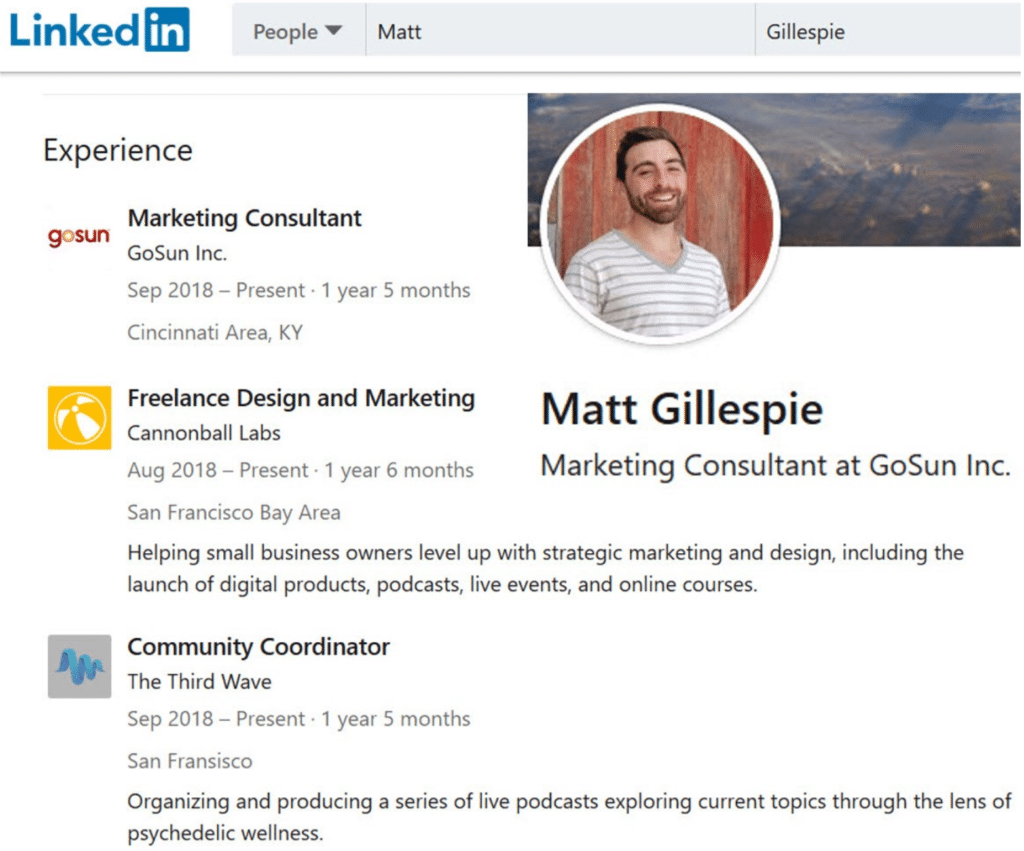
Gillespie performs as an exemplary fail guy in this psychedelic infomercial, presenting a nonexistent problem to be solved: the need for someone to “coach” you through a psychedelic dose that is, by definition, negligible. And Austin is prepared to step in with the readymade solution, for just three low payments of $999.99! As we can see from Austin’s LinkedIn post, he is actively manufacturing credibility—as Ferriss recommends—in order to present himself as a true psychedelic guru; offering services that entail a range of psychedelic experiences, from microdoses to higher doses, all in the pursuit of “Becoming Superhuman.”

Perhaps it’s unsurprising that Austin—who comments on LinkedIn about his recent fascination, “with the concept of the übermensch as popularized by Nietszche…”—appears ready to cash in on vague notions of transcending humanity via drug-induced consciousness. In fact, these are precisely the types of marketing strategies we should expect to see within a nascent “psychedelic industry,” teeming with silicon valley investors, multi-level marketing advocates, cryptocurrency acolytes, and other speculative predators.
This recent media gambit is not Austin’s first attempt to crib strategies from the Tim Ferriss playbook of crafting a façade of expertise; his previous Twitter handle read “@PaulAustinMD” (it has since been changed to @PaulAustin3w). As Business Insider pointed out, Austin isn’t a scientist or doctor. To clarify, Austin’s education amounts to a B.A. in History and Business Management from Hope College.
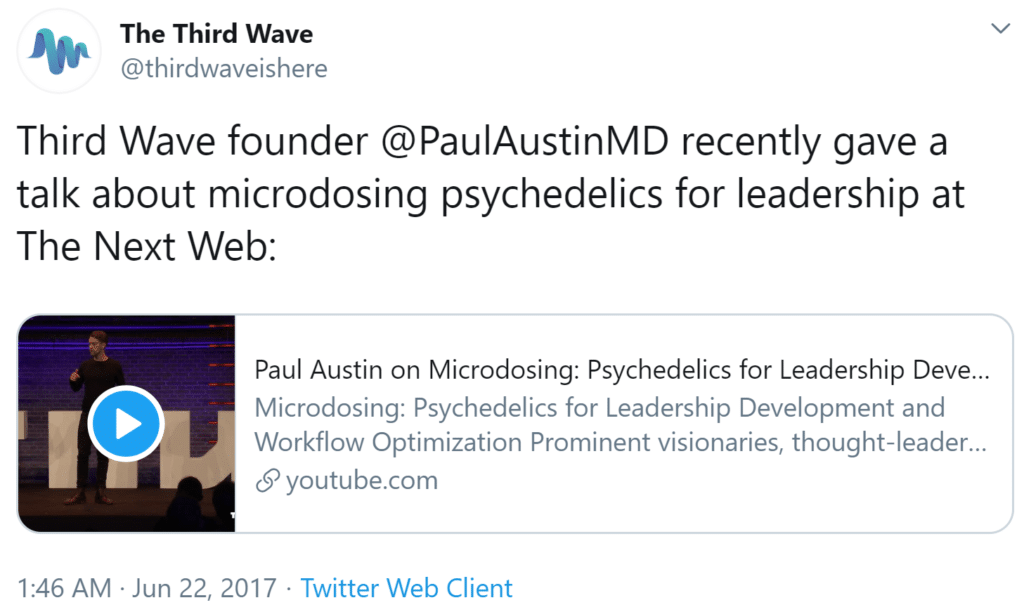
However, as Ferriss teaches, credibility doesn’t come from experience or degrees, it comes from the perception of expertise. Perhaps this explains why Austin misleadingly tagged himself “MD,” used his business associate as marketing bait, and shared fawning reviews of himself as, “Leader of the Pyschedelics [sic],” on his social media channels. If he’s an expert, it’s only because you believe he’s an expert.
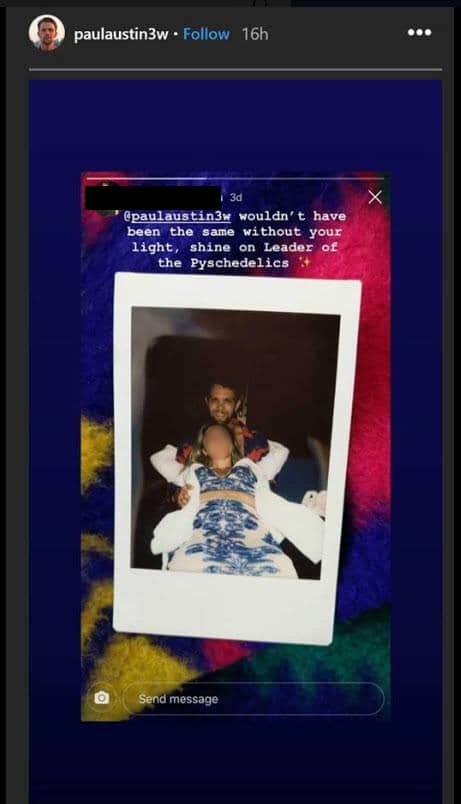
Hey! Before you go… Psymposia is a 501(c)(3) non-profit media organization that offers critical perspectives on drugs, politics, and culture. We strive to ask challenging questions, and we’re committed to independent reporting, critical analysis, and holding those who wield power accountable.
Our perspectives are informed by critical analysis of the systemic crises of capitalism that have directly contributed to the unmitigated growth of addiction, depression, suicide, and the unraveling of our social relations. The same economic elite and powerful corporate interests who have profited from causing these problems are now proposing “solutions”—solutions which both line their pockets and mask the necessity of structural change.
In order for us to keep unpacking these issues and informing our audience, we need your continuing support. You can sustain Psymposia by becoming a supporter for as little as $2 a month.
David Nickles
David Nickles is an underground researcher and harm reduction advocate. He has presented social critiques and commentary on psychedelic culture and radical politics, as well as novel phytochemical data from the DMT-Nexus, at venues around the world. David’s work focuses on the social and cultural implications of psychoactive substances, utilizing critical theory and structural analysis to examine the intersections of drugs and society. He is a vocal opponent of the mainstreaming and commodification of psychedelic compounds and rituals, believing that such approaches inherently obscure the liberatory potential of psychedelic experiences.





